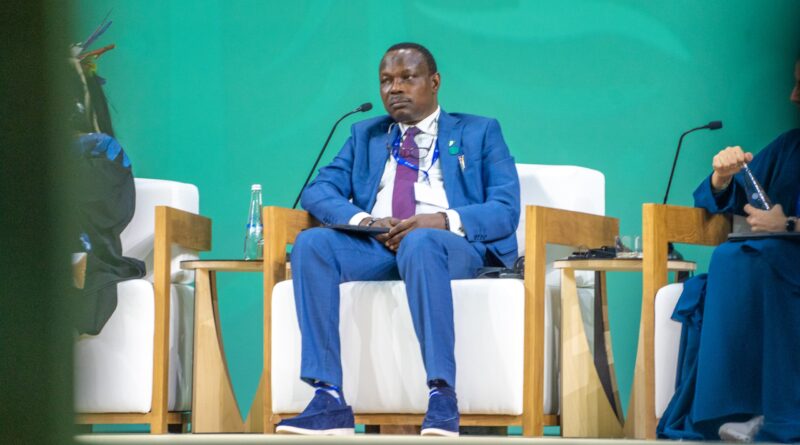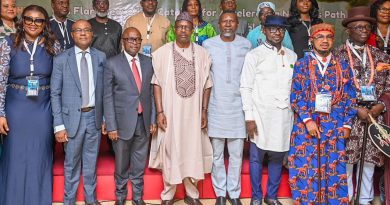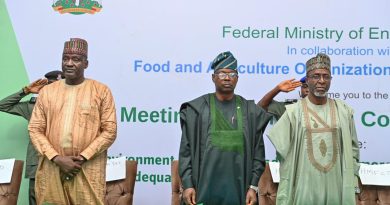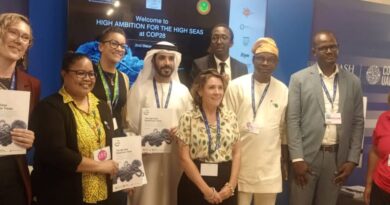Environment Ministers Launch New Alliance to Champion Nature Finance
Dubai, United Arab Emirates (9 December 2023) – Leading, biodiversity-rich countries in the Global South have come together to announce the establishment of a Ministerial Alliance for Nature Finance. The Alliance will work to champion the importance of meeting a central financial pillar of the Kunming-Montreal Global Biodiversity Framework: the commitment to increase international biodiversity finance to developing countries to at least $20 billion annually by 2025, which is roughly double current levels.
Despite the crucial importance of resource mobilization, there are currently no clear plans for how donor countries intend to reach the $20 billion figure. The Alliance will publicly and privately highlight the importance of the $20 billion target and encourage countries to focus on it as a crucial first step in ensuring that the overall global biodiversity framework is successfully implemented.
As part of its work, the Alliance will publicly track nature finance, including commitments from donor countries towards the $20 billion target and showcase the steps Alliance member countries are taking to increase nature finance domestically. The Alliance will also highlight conservation projects ready for investment, helping to demonstrate that ambitious biodiversity conservation is possible with sufficient financing.

Led by Nigeria, the inaugural member countries of the Ministerial Alliance for Nature Finance include Samoa, Liberia, and Sierra Leone. H.E. Dr. Iziaq Kunle Salako, Minister of State for Environment from Nigeria, announced the establishment of the Alliance in his remarks at the marquee event on Nature Day at COP28, From Agreement to Action: Harnessing 30×30 to Tackle Climate Change. The Alliance will welcome and announce additional member countries at the Sixth Session of the United Nations Environment Assembly in 2024.
As part of this announcement, the following leaders issued statements:
H.E. Dr. Iziaq Kunle Salako, Minister of State for Environment, Nigeria, said:
“To be clear, this commitment to international biodiversity finance is not charity. It is a promise that must be kept and one of many investments that is required to help achieve global nature and climate goals, sustainable economic development, social stability and geopolitical security. The countries that are best positioned to make this investment are those that have benefited economically the most from practices that have negatively impacted the state of biodiversity inside and outside of their borders. Delivering on the $20 billion per year pledge by 2025 or sooner is crucial for the success of our shared ambitions and will play an instrumental role in unlocking resources domestically.
“Through the Ministerial Alliance for Nature Finance we will not only work to hold Parties accountable to this $20 billion promise to nature, but we will highlight the actions that we are taking domestically to do our part in helping to close the biodiversity finance gap. Over half of the global GDP relies on rich biodiversity and healthy ecosystems. If we want to preserve the global economy, we must invest in protected areas just as we would invest in anything else that would provide an enormous return long into the future.”
H.E. Toeolesulusulu Cedric Schuster, Minister for the Ministry of Natural Resources and Environment, Samoa, said:
“Samoa is pleased to join the Ministerial Alliance for Nature Finance. We are committed to helping the world protect at least 30 percent of the planet’s ocean, but we cannot do it alone or without sufficient financing. All countries have a role to play in funding the protection of nature as an essential way to fight climate change, preserve biodiversity, and support cultures, public health, and livelihoods. Meeting the $20 billion target will be the first test of whether world leaders are prepared to keep their promise to nature and future generations.”
Prof Wilson K. Tarpeh, Executive Director/CEO of the Environmental Protection Agency, Liberia, said:
“Liberia is excited to join the Ministerial Alliance for Nature Finance. Liberia is home to 43% of the upper Guinean Forest, which is one of the most biodiverse regions in the world. As a country, we are ready to increase protections for our rich biodiversity, but we cannot do so without sufficient financing. A crucial part of this is international finance, which can catalyze the additional domestic resources that we need to achieve our goals. It is imperative that Global North countries keep their promise of delivering $20 billion USD annually by 2025 to Global South countries that safeguard the world’s biodiversity. This is critical not just for countries like Liberia, but for the survival of all life on Earth.”
H.E Jiwoh Abdulai, Minister of Environment and Climate Change, Sierra Leone, said:
“Nature has regulated the planet’s climate for centuries. Sierra Leone, like other countries in the Upper Guinean Forests region, has been providing ecosystem services to the world for decades free of charge. However, undervaluation of the assets producing these services has led to land degradation and deforestation. We can reverse this trend if the world starts valuing these natural assets correctly and capital is invested in these natural carbon sinks. These natural assets are nature’s technology for Climate Change Mitigation. That is why Sierra Leone is proud to join the Ministerial Alliance for Nature Finance. Without adequate Financing we cannot reverse the twin crises of biodiversity loss and climate change.”

ADDRESS BY DR IZIAQ ADEKUNLE SALAKO, MINISTER OF STATE FOR ENVIRONMENT, FEDERAL REPUBLIC OF NIGERIA AT THE COP28 PRESIDENCY 30 X 30 HIGH LEVEL EVENT ON NATURE DAY AT COP28, DUBAI ON 9TH DECEMBER, 2023
Protocols
I am honoured to bring greetings to you from Nigeria and from the President of my country, President Bola Ahmed Tinubu GCFR, a nature champion leading Nigeria in the path of sustainable use of our natural resources and heightened attention to nature based solutions to address climate change. As we gather to highlight progress made towards protecting and conserving at least 30% of the world’s lands and oceans to help deliver on our Paris Agreement Goal, Nigeria reiterates her commitment to work with the global community to achieve the 1.5 degree climate target.
2.The African continent is more vulnerable to climate change than any other. It is clear that there is inequity in the ways countries are impacted by the biodiversity crisis. In West Africa, and in my country, a lack of solutions means that our communities become poorer, our food security is jeopardized, and our rural populations are forced to relocate, resulting in loss of livelihoods, security challenges, and sadly a lot of times, loss of lives. This scenario is not obtainable everywhere.
3.The vision of Nigeria and the rest of Africa is to ensure that the World truly unites and responds as one. Because Africa will be the most affected by climate change, we are united in being the most ambitious in protecting our lands and our seas.
4.In the ECOWAS region alone, ECOWAS countries have reached a consensus to support the ambitious target of protecting 30% of our lands and oceans by 2030 which is evident by the 14 Member State having joined the High Ambition Coalition for Nature and People. Nigeria as a member of HAC is mobilizing ECOWAS countries to launch a regional coordination process to map out our joint contribution to 30 by 30. And just 2 week ago, ECOWAS countries met in Abuja, Nigeria, and agreed on a pathway to promptly ratify the newly adopted high-seas treaty to facilitate the designation of highly and fully protected areas in the global ocean beyond national jurisdiction. For Nigeria this is an essential and urgent step, and we invite all of you to ratify this treaty promptly.
5.But this, ladies and gentlemen, is only part of the solution and we must unite to ensure that our call for ambition for the expansion of protected areas is matched with equal ambition on finance, on halting human-induced extinction of wild species, on mutual accountability to halt forest loss and degradation, on securing species recovery and the restoration of jeopardized ecosystems. We must also ensure that we are fully prepared to keep each other accountable in the implementation of global commitments.
6.We know that in order to address biodiversity loss we will need to increase our investment in nature protection between 500 and 900 billion USD per year.
- In Montreal, a commitment was made to deliver at least 20 billion USD per year in international biodiversity finance to developing countries by 2025. This is a modest step in the right direction and we must urgently set up accountability mechanisms to track investments from developed to developing countries, in order to secure the achievement of these nature finance targets.
8.I am very pleased to announce that Nigeria is launching a Ministerial Alliance for Nature Finance alongside Liberia, Samoa and Sierra Leone. As part of the biodiversity-rich countries from the Global South, we are uniting to champion
the importance of meeting the biodiversity financing target that the World agreed to last year at COP15. The goal of this Alliance is to promote ambition on biodiversity finance and mutual accountability in delivering the 20 billion USD per year by 2025 – a pledge made to developing countries.
9.To be clear, this commitment to international biodiversity finance is not charity. It is a promise that must be kept and one of many investments that is required to help achieve global nature and climate goals, sustainable economic development, social stability and geopolitical security.
- The countries that are best positioned to make this investment are those that have benefited economically the most from practices that have negatively impacted the state of biodiversity inside and outside of their borders. Delivering on the $20 billion per year pledge by 2025 or sooner is crucial for the success of our shared ambitions and will play an instrumental role in unlocking resources domestically.
- Through the Ministerial Alliance for Nature Finance we will not only work to hold Parties accountable to this $20 billion promise to nature, but we will highlight the actions that we are taking domestically to do our part in helping to close the biodiversity finance gap.
12.Over half of the global GDP relies on rich biodiversity and healthy ecosystems. If we want to preserve the global economy, we must invest in protected areas just as we would invest in anything else that would provide an enormous return long into the future.
- Join the Ministerial Alliance for Nature Finance now as a commitment to meeting the nature finance goals essential to the implementation of 30 by 30.
- There is no time to wait – let us act now, together, for nature.
- I thank you all for your kind attention and wish you safe trip back as we begin to round up with COP28.





